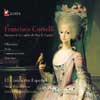Corselli Orchestral and Vocal Works
Some fine voices in excellent transfers which should please Charpentier fans
View record and artist detailsRecord and Artist Details
Composer or Director: Francesco Corselli
Genre:
Orchestral
Label: Glossa
Magazine Review Date: 5/2003
Media Format: CD or Download
Media Runtime: 63
Mastering:
Stereo
DDD
Catalogue Number: GCD920307

Tracks:
| Composition | Artist Credit |
|---|---|
| Farnace, Movement: Sinfonia |
Francesco Corselli, Composer
(El) Concierto Español Emilio Moreno, Violin Francesco Corselli, Composer |
| Achille in Sciro, Movement: Ouverture |
Francesco Corselli, Composer
(El) Concierto Español Emilio Moreno, Violin Francesco Corselli, Composer |
| A ti invisible Ruiseñor Canoro |
Francesco Corselli, Composer
(El) Concierto Español Emilio Moreno, Violin Francesco Corselli, Composer Nuria Rial, Soprano |
| Achille in Sciro, Movement: Marcia |
Francesco Corselli, Composer
(El) Concierto Español Emilio Moreno, Violin Francesco Corselli, Composer |
| Lectio in Sabato Sancto |
Francesco Corselli, Composer
(El) Concierto Español Emilio Moreno, Violin Francesco Corselli, Composer Nuria Rial, Soprano |
| Oratorio de Santa Clotilde |
Francesco Corselli, Composer
(El) Concierto Español Emilio Moreno, Violin Francesco Corselli, Composer |
| Lamentaciónes |
Francesco Corselli, Composer
(El) Concierto Español Emilio Moreno, Violin Francesco Corselli, Composer Nuria Rial, Soprano |
| Hasta aquí, Dios amante |
Francesco Corselli, Composer
(El) Concierto Español Emilio Moreno, Violin Francesco Corselli, Composer Nuria Rial, Soprano |
| Farnace, Movement: Marcia |
Francesco Corselli, Composer
(El) Concierto Español Emilio Moreno, Violin Francesco Corselli, Composer |
Author: rnichols
Poulenc regarded Gustave Charpentier’s opera Louise as a success, as opposed to the ‘lamentable failure’ of Dukas’s Ariane et Barbe-Bleue. So one has to acknowledge that Charpentier had something. But what? I incline to the position of Martin Cooper, who claimed that Charpentier ‘had neither taste nor distinction, but he had a certain sort of personality’.
Impressions d’Italie, written during his Prix de Rome prize-winner’s stay in that city in the late 1880s, made quite a stir in the French musical firmament. It must have been quite a relief in the 1890s to listen to an orchestral work that owed absolutely nothing to Wagner and that included one or two whistleable tunes, even if these turned out to be Italian folk songs. The work also had the virtue of assuring the Establishment that the enforced sojourn in the Eternal City could, after all, be artistically profitable and that you didn’t have to believe what Berlioz wrote about it in his memoirs. But beyond that, I admit to being puzzled by the piece’s success.
I won’t go on, since my distaste for Charpentier’s music, ‘Depuis le jour’ from Louise always excepted, is too great to be camouflaged. But for Charpentier-lovers there is probably much here to enjoy. It’s always a pleasure to listen to Germaine Féraldy – here in a setting of Verlaine’s Clair de lune in the Sérénade – and the tenor Jean Planel has that distinctive quality of voice usually referred to as ‘plangent’, but gratefully so. He is undoubtedly the tenor throughout these extracts, although credited only for the songs at the end. Note also that the setting of Les chevaux de bois, billed as on track 15, is in fact on the final track, 18. Throughout, the engineers have done an excellent job of eliminating bubble and squeak. Obviously they were unable to do anything about the occasionally ragged women’s chorus; but this can always be taken as contributing to the ’30s period charm.
Impressions d’Italie, written during his Prix de Rome prize-winner’s stay in that city in the late 1880s, made quite a stir in the French musical firmament. It must have been quite a relief in the 1890s to listen to an orchestral work that owed absolutely nothing to Wagner and that included one or two whistleable tunes, even if these turned out to be Italian folk songs. The work also had the virtue of assuring the Establishment that the enforced sojourn in the Eternal City could, after all, be artistically profitable and that you didn’t have to believe what Berlioz wrote about it in his memoirs. But beyond that, I admit to being puzzled by the piece’s success.
I won’t go on, since my distaste for Charpentier’s music, ‘Depuis le jour’ from Louise always excepted, is too great to be camouflaged. But for Charpentier-lovers there is probably much here to enjoy. It’s always a pleasure to listen to Germaine Féraldy – here in a setting of Verlaine’s Clair de lune in the Sérénade – and the tenor Jean Planel has that distinctive quality of voice usually referred to as ‘plangent’, but gratefully so. He is undoubtedly the tenor throughout these extracts, although credited only for the songs at the end. Note also that the setting of Les chevaux de bois, billed as on track 15, is in fact on the final track, 18. Throughout, the engineers have done an excellent job of eliminating bubble and squeak. Obviously they were unable to do anything about the occasionally ragged women’s chorus; but this can always be taken as contributing to the ’30s period charm.
Discover the world's largest classical music catalogue with Presto Music.

Gramophone Digital Club
- Digital Edition
- Digital Archive
- Reviews Database
- Full website access
From £8.75 / month
Subscribe
Gramophone Full Club
- Print Edition
- Digital Edition
- Digital Archive
- Reviews Database
- Full website access
From £11.00 / month
Subscribe
If you are a library, university or other organisation that would be interested in an institutional subscription to Gramophone please click here for further information.




